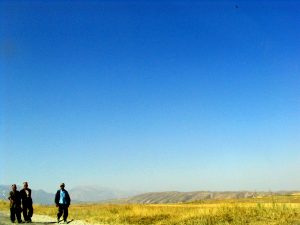Last week, gunshots rang out on the Kyrgyz-Tajik border. The area, in southern Kyrgyzstan’s Batken region, is a frequent flashpoint along the pockmarked borders of Central Asia’s Fergana Valley.
According to RFE/RL, there were at least 10 skirmishes last year in the area. Local media reported that in the early morning of January 9, a villager from Kok-Tash, a Kyrgyz village near the Tajik exclave Vorukh, claimed that three people fled into Tajik territory after attempting to set a house on fire on the Kyrgyz side of the border. The next day, per 24.kg’s reports, a car traveling between Batken and Kok-Tash was stoned by Tajik citizens in the Kocho-Karyn area. Then a house in the Dakhma area was reportedly stoned. When the Kyrgyz police and border guards arrived, they were reportedly shot at from the Tajik area.
The Tajik ambassador in Bishkek was summoned by the Kyrgyz Foreign Ministry to take delivery of a note of protest and Kyrgyz authorities evacuated residents of Dakhma, 254 Kyrgyz citizens, mostly women and children, according to RFE/RL. The residents were allowed to return a few days later.
The Tajik side’s version is slightly different, laying blame on the Kyrgyz side. And on January 11 Kyrgyz authorities reportedly detained four local residents for involvement in the clashes and charged them with hooliganism. A crowd gathered in the Kyrgyz capital to protest the arrests on January 13, and again on January 15.
This episode, as noted above, is far from the first rock-throwing, shot-firing event in the area. For example, in 2015 the two sides traded moves — the Tajiks blocking the road to a cemetery, the Kyrgyz blocking a canal, following by a riot of stone-throwing reportedly including 120 Tajiks and 80 Kyrgyz. Last September, four were killed in an exchange of gunfire.
Kyrgyzstan and Tajikistan share a 971-kilometer border, 451 kilometers of which have not been delineated.
On January 14, Kyrgyz and Tajik officials held initial talks at a border checkpoint near the Tajik village of Guliston and the Kyrgyz village of Kyzyl-Bel in the Batken region. Kyrgyz Deputy Prime Minister Jenish Razakov and Tajik Deputy Prime Minister Azim Ibrohim led the respective sides. The next day, RFE/RL reported that the two sides had agreed to begin a land swap process in the disputed area.
According to Razakov, a joint protocol was signed for a working group to meet by February 15 and agree on a line of demarcation for the 114-kilometer border segment in dispute in the area of the recent clashes. Per RFE/RL’s report, “March 1 they aim to define areas ‘equal by size and significance’ for exchange.”
Bilateral talks have followed every major flare-up along the Kyrgyz-Tajik border, yet problems persist because there is a huge gap between high-level efforts to define borders and the local-level sentiments and effects of setting down those borders. The issue of delimitation between states, in a sense, is far less controversial than the process of demarcation. The physical process of marking the border — with fences, border crossings, etc — generates new difficulties. Meanwhile, old local grudges remain.
At a high level, it makes sense to simplify the Kyrgyz-Tajik border with land swaps, but it will not be so simple as a trade of territory. The issue is sensitive locally, and has potential to be a nationalistic flashpoint more broadly. What Kyrgyz or Tajik politician or official wants their name on that particular set of paperwork, given the likely very difficult implementation of any such swap and the potential use against them at a later point in time? And then there are more practical questions: What happens to the people living in the areas swapped?

































